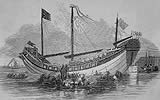A Boxing Day Special for You – Charles Dickens and China
Posted: December 26th, 2011 | 1 Comment »What could be more Christmas than Dickens? Not much to me – it’s a time to watch A Christmas Carol, remember Tiny Tim and lap up all that Victorian London seasonal feel stuff. This year Dickens fans have had a special treat – like many others I’ve spent Christmas reading Claire Tomalin’s excellent Charles Dickens A Life which, among other things mostly London-centred, got me thinking about Dickens and China. So here’s my guide to Dickens and his China references, including those that are a bit of a stretch – I’ve remembered as many as I can but if anybody has any others do let me know.
- Dickens knew that the mere hint of a past in the East was enough to pique the readers interest – in Little Dorrit (first published in serial form in 1855) Dickens’s Arthur Clennam raises the reader’s interest when he is shown returning to London after working for fifteen years in China with his recently deceased father. As his father died, he has given Arthur a mysterious watch, murmuring, “Your mother.†Naturally Arthur assumes it is intended for Mrs. Clennam, whom he and the world supposed to be his mother. Inside the watch casing is an old silk paper with the initials D N F (Do Not Forget). It is a message – but when Arthur shows it to the harsh and implacable Mrs. Clennam, a religious fanatic, she refuses to reveal what it means. So begins one of Dickens’s best loved books of twists and turns of fortune and misfortune which though written in the mid-nineteenth century is actually set in the 1820s.
- Dickens notes the popularity of tea from China among the working classes and wrote the rhyme in Barnaby Rudge (1841))  ‘Polly put the kettle on, we’ll all have tea’, which was still being sung by my nan in the 1970s!
- Dickens noted opium several times and in Bleak House (1852) the destitute Captain Hawdon dies of an opium overdose. Dickens had visited a Shadwell opium den in East London conducting research for what would become his last, and unfinished, novel, The Mystery of Edwin Drood (1870). In the opening scene, Dickens’s character John Jasper, who lives a double life as an opium addict and a respected member of society, awakens from a narcotic slumber in an opium den with two other semi-conscious men and their supplier, an old woman named Princess Puffer, based on a real life elderly East End pusher Dickens had met theatrically known as “Opium Salâ€:‘At the bottom of this slough of grimy Despond is the little breathless garret where Johnny the Chinaman swelters night and day curled up on his gruesome couch, carefully toasting in the dim flame of a smoky lamp the tiny lumps of delight which shall transport the opium-smoker for a while into his paradise.’ Dickens apparently didn’t think much of the East End or the Chinese but perhaps saw that opium could be better than alcohol abuse. Opium Sal explains as she prepares a pipe: ‘O me, O me, my lungs is weak, my lungs is bad! It’s nearly ready for ye, deary. Ah, poor me, poor me, my poor hand shakes like to drop off! I see ye coming-to, and I ses to my poor self, “I’ll have another ready for him, and he’ll bear in mind the market price of opium, and pay accordingly.†O my poor head! I makes my pipes of old penny ink-bottles, ye see, deary – this is one – and I fits-in a mouthpiece, this way and I takes my mixter out of this thimble with this little horn spoon; and so I fills, deary. Ah, my poor nerves! I got Heavens-hard drunk for sixteen years afore I took to this; but this don’t hurt me, not to speak of. And it takes away the hunger as well as wittles, deary.’
- Opium eaters were often differentiated from opium smokers as the former became hooked after using opium for medicinal purposes and the latter while using the drug recreationally. They were a commonly acknowledged social group – Dickens has Mr Pickwick refers to the rather dim-witted servant Joe, the “fat boyâ€, as a ‘young opium eater’ in The Pickwick Papers (1836).
- And finally, of course Dickens never went to China but he did set foot aboard a Chinese junk (below), one that had actually been sailed from Hong Kong, moored at Blackfriars Bridge from 1848 attracting crowds of curious visitors. Dickens went twice. I posted more details on the Blakfriars junk back in 2008 here.


Interesting and illuminating information about the great man and his writing. In those days, of course, Dickens was in the middle of our industrial revolution, with the advent of cars, trains and mechanised manufacturing; his views were very withering about China and its culture, which he may have regretted with the advantage of hindsight. Incidentally, he did enjoy a snort of laudanum himself- do look at the website below- it’s fascinating.
http://news.bbc.co.uk/nol/ukfs_news/hi/newsid_7450000/newsid_7457000/7457066.stm